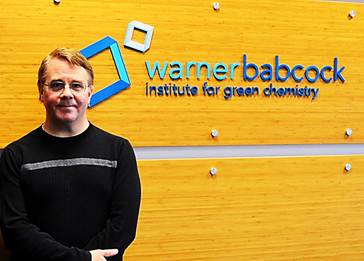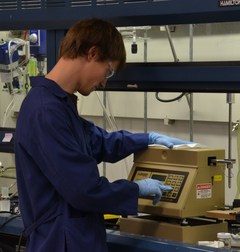
Name Dr. John Warner
- Education PhD in Chemistry, Princeton University; BS in Chemistry from UMASS Boston
- Target Audience Undergraduate

Many products in our world today are made with toxic materials. Now, picture a world without toxins - no pollution, no hazardous materials, and no harmful products. Green Chemists, like John Warner PhD, are working to make this dream a reality. Learn what makes Dr. Warner's work as a green chemist not only important to us, but critical for generations to come in this exclusive Kids Ahead article.
My whole thesis is that people have an awareness of the environment and a need to do something meaningful with
I was a chemist and cared about the world. In the 1990's, Paul Anastas and I wrote a book on green chemistry, Green Chemistry: Theory and Practice, that defined the field. My career path was unique in that I didn't see a career and decide to pursue it - I created it. In my opinion, one of the most important things a person can do is dedicate their life to inventing safe materials. That's something important for everyone to know - life isn't about finding your place, it's about making your place.

The people that I work with. Solving problems requires people with different perspectives, different ideas and from different backgrounds. The human component of interacting with people is the best part of my job - in my opinion no one person can solve a problem alone.
Not really. Actually, I graduated from my high school as the class musician and had every expectation of going into music. A lot of kids graduate from high school thinking that they may be locked into a career for the rest of their lives and that's just not the case. I started college as a music major and kind of stumbled into chemistry.
There was a moment where I came to this realization that I had become a chemist, but there wasn't a moment of epiphany that led to that point. There wasn't a grand plan to become a chemist - it just happened organically.
The biggest challenge for me was recognizing how to deal with options and choices that I've made. Happiness and satisfaction isn't an external thing. Instead of focusing on things you may have chosen not to do, focus on what you've chosen to do and whether or not that is making you happy. You decide yourself, internally, what makes you happy and what satisfies you.
I've had tons of inspirations. You go through life accumulating knowledge from the people around you - mentors, loved ones, friends... It's hard to point to one specific individual. The way I look at the world is an amalgam through all their eyes.
Internships are important. If you think you might like something, find a way to experience it at some level to determine if it's the right fit for you.
I sure hope that I have more competition. It's great for my business, but I hope to see more institutes and organizations that have a similar mission. For the field to grow - I need to have more competition. The only way that the field of green chemistry will grow is if future students insist on it becoming a part of college chemistry curriculum and if the public demands better products.
(adapted from warnerbabcock.com)
Alzheimer's - medical disorder causing dementia
Green Chemistry - chemical research and engineering that encourages the design of products and processes that minimize the use and generation of hazardous substances
Parkinson's - a degenerative disorder of the central nervous system characterized by tremor and impaired muscular coordination
Pharmaceuticals - legal drugs (non-street drugs)
Sustainable - ability to be maintained at a certain rate or level
Thesis - a statement declares what you believe and what you intend to prove
Toxins - any chemical or mixture that may be harmful to the environment and to human health if inhaled, swallowed, or absorbed through the skin
(adapted from dictionary.com)
Why did you choose your major? Did you always know this is what you wan…
Lisa Ingham excels on the field and in the classroom as an Engineering …
Why did you choose your major? Did you always know this is what you wan…